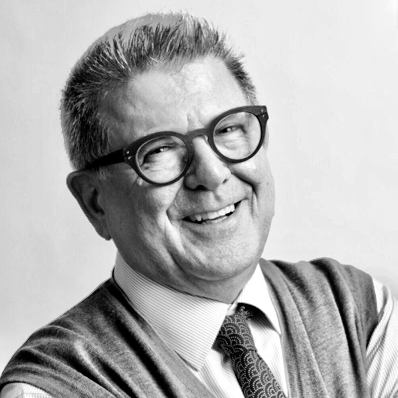
(March 26, 2021) Liz LeClair, current chair of AFP Global’s Women’s Impact Initiative and major donor fundraiser based in Halifax, Nova Scotia, has filed a formal ethics complaint with the Association of Fundraising Professionals against Tom Ahern, a copywriter based in Rhode Island, a regular on the fundraising conference circuit and author of several books about writing donor-focused fundraising copy, including one he co-authored with his wife Simone Joyeaux.
LeClair is also requesting that Ahern’s books be removed from the resource reading list for the CFRE, a worldwide certification for fundraising professionals.
The complaint comes after three weeks of social media posts from Ahern challenging the legitimacy of an organization based in Seattle, Washington called Community-Centred Fundraising, which describes itself as a movement led by Black, Indigenous and people of colour that “uses … fundraising principles and practices to build the power and voice of communities of colour.”
But the roots of the ethics complaint didn’t begin in Seattle, Washington or Rhode Island. Its genesis bubbled up in the form of the Inspire Global Webinar Series organized by Precision Fundraising in Melbourne, Australia, which offered a “stellar line-up of global fundraising legends.”
“The original intent was to organise an event featuring 4 to 6 speakers to present individually via a webinar as a way of giving back to the sector after a COVID-impacted 2020,” Cory Hall, Precision Fundraising’s managing director, told The Charity Report in an email. “It was initially thought that this would be a one-day event. We extended an invitation to over 30 speakers, including women and people of colour. Unfortunately, those who confirmed were predominantly male.”
The Twitterverse took note that 16 of the 19 speakers were white men.
David Lacey, a fundraiser based in East Sussex, England shared his dismay on February 28.
Simon Scriver, an award winning Irish fundraising consultant who regularly speaks at international conferences, withdrew from the webinar series as did a few other planned speakers, and posted about the emerging critique.
Precision Fundraising decided to withdraw the webinars.
“We placed the series on hold,” said Hall, “and we’ve have notified all the speakers that we are developing a framework that better represents the broad diversity across the sector.”
And to clarify, Hall told The Charity Report “at no time was Tom part of our lineup. He was one of over 30 fundraisers we reached out to, but we never received a reply.”
Hall further addressed the issue in a LinkedIn post around March 11. “In retrospect,” the statement said, “we shouldn’t have gone ahead with the line up … I regret that decision and am sorry for the offence it has caused .. we made a mistake [but] we are committed to getting better and learning about how to approach diversity on all fronts.”
Nevertheless, and despite the hosts themselves having taken the series back to the workshop for a re-think, Tom Ahern, based on David Lacey’s point about the make-up of the panel, lashed out in an unusual LinkedIn post, which not only ridiculed people like Henry Rowling who were speaking out, seemed to be “sticking up for” the original speakers (none of whom, we assume, requested Tom Ahern to come to their defence). At the same time, Ahern seemed to lash out at a perceived enemy, “… thanks to wokeness & #metoo & other movements like CCF.”
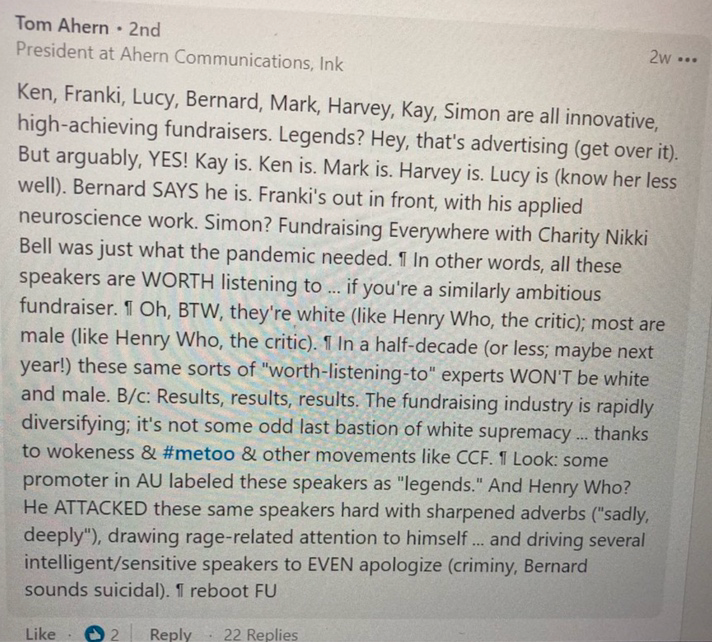
It is in this LinkedIn post that Ahern makes the odd connection to Community-Centric Fundraising (CCF), an organization based in Seattle, Washington, which had nothing to do with the webinars, but that began in 2017 as a group of fundraisers meeting regularly to talk about developing a new fundraising model based on the needs of the community, especially communities of colour, as opposed to be driven by the needs of wealthy (almost entirely white) donors.
In July 2020, with the support of several foundations and individuals, the organization held an official launch with more than 2,700 people attending. CCF was resonating with people who were experiencing how current fundraising models were not serving the needs of Black, Indigenous and organizations led by people of colour, and that were, in fact, driving out employees of colour. It became a destination for people who saw inequity in the philanthropic sector and wanted to change the way of doing things.
Ahern, himself, is a proponent of the concept of “donor-centred fundraising,” a fundraising theory which, “puts satisfying donors’ need for meaningful information at the top of the agenda,” according to fundraising specialist and author Penelope Burk, another advocate of the donor-centred model.
CCF seems to have very little to do with a now cancelled webinar series being hosted from Melbourne, Australia, especially one that Ahern was not involved with in any way, shape or form.
Yet within days, Ahern began a series of social media posts that ridiculed CCF and the principles of community-centric fundraising in order to draw attention to a webinar he had undertaken to do with the South Sound, Washington chapter of AFP.

The criticism of Ahern’s bringing CCF to bear on a cancelled webinar series came fast and furious, including from Liz LeClair, who raised issues of ‘white fragility’.
As defined by Medical News Today, white fragility is how “engaging in conversations about racism may trigger a range of defensive actions, feelings, and behaviors, such as anger, fear, and silence.”
Then, on March 13, Ahern got personal with a put down of a fundraiser who said she was uncomfortable with fundraising that solely focused on the donor. Ahern called her a “wannabe” fundraiser, a “novice” who has been “trained” by CCF to be skeptical of donors.
Ahern’s criticism appeared to many to be an unseemly unprovoked display of an established white male “thought leader,” a conference circuit regular for decades, careening around the virtual globe like a bowling ball intent on knocking down fundraisers of colour like so many bowling pins, belittling the systemic racism they and others have experienced along the way.
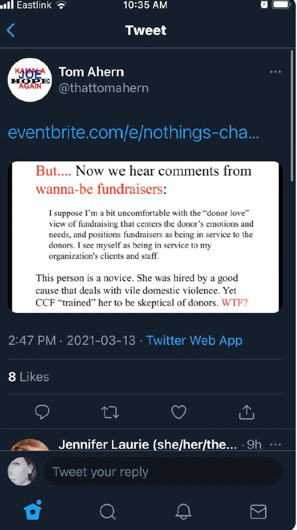
Despite entreaties for him to stop, Ahern continued with the social media behaviour that was offensive to many, especially the racialized groups and people at which he was taking aim, including Vu Le, the former Executive Director of RVC, “a nonprofit in Seattle that promotes social justice by developing leaders of color, strengthening organizations led by communities of color, and fostering collaboration between diverse communities,” and frequent speaker about community-centric fundraising.
The Charity Report became fully aware of the impact of Ahern’s social media behaviour when it received an email from CCF co-chair Michelle Muri on March 18, which read, in part,
“Some of us [at CCF] have been receiving regular unpleasant, spiteful and generally bizarre communications, some of which could be considered hate mail, from one of our sector’s respected fundraising thought leaders, Tom Ahern. Our consensus has been to ignore his communications to us.
“However, recently Tom Ahern’s behavior has escalated, showing up in public spaces including social media posts involving overt racist and sexist commentary targeting CCF.
“I’ve held back on reaching out about this, as this movement is about expanding the conversation and welcoming different viewpoints. As you know, one of our principles is to foster a sense of belonging, not othering. I also do not wish to amplify his messages. However, Tom’s comments have gone beyond questioning our ideas, and civil discourse and are causing harm and pain to those in our community.”
The email requested assistance in responding to Ahern’s continued and extraordinary hammering of CCF.
And once again, the Twitterverse showed the length of the journey the philanthropic sector—and the perceived keepers of its knowledge—have to take before it comes close to realizing the equity so many people claimed it desired in the aftermath of the killing of George Floyd.
And despite the firestorm of racial animosity Ahern was kicking up around himself—and about which he was receiving messages asking him to stop—he remained undeterred in using CCF as a target in order to promote his own work including a webinar for the South Sound AFP, which he’s now referring to as a “megawebinar.”
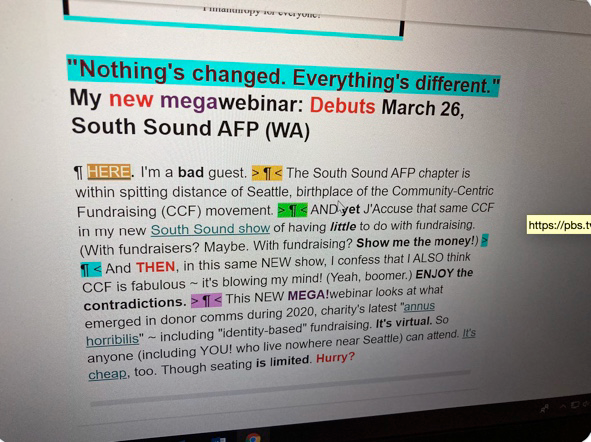
But by then, the board of directors of the AFP South Sound chapter had heard enough and on March 19 issued a statement, which read in part,
Yesterday our board became aware of recent messaging from planned speaker, Tom Ahern, that we and our community members experienced as divisive, derogatory and hurtful. We heard and felt the negative impact these statements had on our community, especially those who face racism and white supremacy every day.
The statements made by Tom Ahern are his own and are not in alignment with our values. The previously scheduled program for March 26 has been canceled. Registrants will be issued a full refund. We are grateful for the honest feedback and dialogue from our global community.
Then on March 21, Bloomerang, a donor management software provider based in Indianapolis, Indiana, who listed Tom Ahern as its “Donor Communication Head Coach,” cut him loose, issuing the following statement:
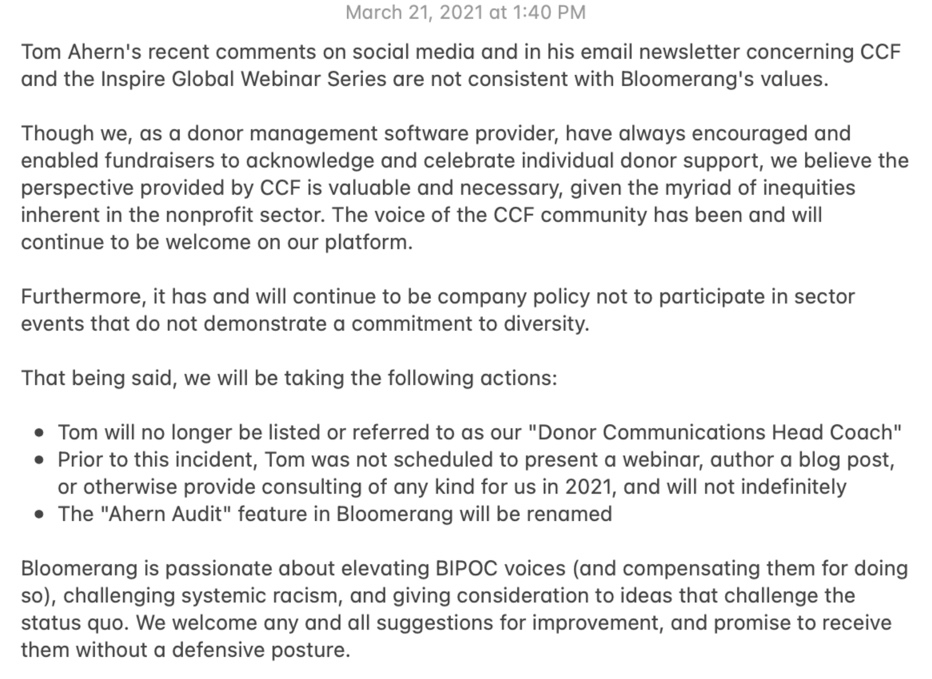
Two days later, Ahern issued a statement saying “I’ve reread my AFP code of Ethical Principles. Among its values is this: “Treat all people with dignity and respect.” He apologized to “all of you who’ve given me your trust and hearts and minds over the years,” but makes no mention of those who haven’t given him their trust, hearts and minds.
It will be up to the APF Ethics Committee to determine if Tom Ahern should have checked the code prior to causing significant damage to people he only knew by their desire to develop a new fundraising model that was based on the needs of the community, especially communities of colour.
“Anyone may file a complaint alleging a violation of the AFP Code by an AFP member or a person holding an AFP-sanctioned credential, according to AFP. The complaint must be written on an AFP Complaint Form and signed by an individual.”
The guidelines don’t specify if the number of complaints received makes any difference to its decision making process. As of March 26, 2021, The Charity Report is only aware of Liz Clair’s complaint.
The official AFP Complaint Form can be found here in English and here in Spanish.
The time it takes to process a complaint can vary says AFP and includes factors such as the completeness of the documentation, “the promptness of responses to Ethics Committee communications by the complainant(s) and the person against whom the complaint is lodged, whether a hearing must be held.”
A complaint that does not require a hearing can take six months. If a hearing is required, the process can be up to a year.
The complaint against Tom Ahern puts a spotlight on the AFP Ethics Committee’s ability to be able to deal with professional misconduct based on issues of privilege and race. AFP has made it clear that conceptually it is fully behind inclusion, equity and diversity. But, with the real life examples now in front of it, it will be of great interest to observe how the organization, whose members represent the philanthropic sector, a sector increasingly viewed as being built on colonialism and white supremacy, handles the issue in practice.
It’s easy to imagine this could be the first of many complaints it receives about race-based behaviour, especially as people see it as a potential space to have professional misconduct around racism called on the carpet.
Related
Black Fatigue: Revealing the simple truth that Black folks are tired October 20, 2020
Feature Interview with Shanaaz Gokool: The cost of seeking justice July 29, 2020
Allegations of sexual misconduct, racism and homophobia are rocking the Canadian Museum for Human Rights June 29, 2020
Charity, Philanthropy and the Structures of Racism June 17, 2020